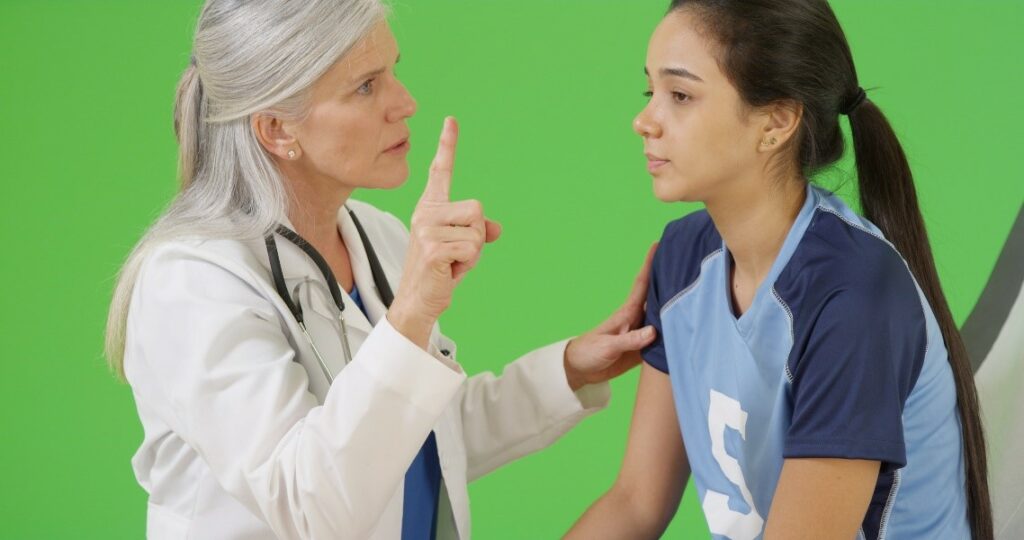Concussion: Why Seeing A Speech Pathologist After May Be Beneficial For Your Child

What is a Concussion?
A concussion is a traumatic brain injury (TBI). This occurs when the brain is damaged suddenly by an external force. A TBI can result from the skull being penetrated or pierced by an object. Likewise, it could also occur when the head is forcefully struck by or hits an object. The severity of a TBI can be mild, moderate, or severe due to the damage done to the brain.5 In fact, approximately 1.5-2 million people in the United States sustain a TBI each year. Of these, 75% are concussions. Therefore, concussions are the most common type of TBI.1 Concussions are often called mild traumatic brain injury (mTBI), but concussions are serious. The term “mild” refers to the severity of the original physical trauma, but it does not indicate the severity of symptoms following the injury.
Symptoms of a Concussion
A person with a mTBI may or may not lose consciousness at the time of injury, however, mTBI is characterized by one or more of the follow symptoms:
- Loss of consciousness
- Memory loss immediately prior to or following the injury
- A change in mental status (for example: confusion, agitation, fatigue, etc.), or focal neurological deficits (such as: loss of coordination, dilated pupil or pupils, dizziness, etc.)2,5 immediately prior to or following the injury
Recovery
Recovery from an mTBI is not always quick, for example, it can be sporadic. Additionally, some people suffer long-term impairments. This is known as post-concussive syndrome (PCS). People with PCS may demonstrate significant changes in personality and deficits in cognition.2
Impairments Following a Concussion
The cognitive/communicative impairments following mTBI can include deficits in speech, language, and social communication, as well as information processing, attention, memory, and swallowing.6 Moreover, it is also common to have deficits in executive functioning skills, such as planning and organizing, time management, and completing tasks, in addition to, monitoring and inhibiting behavior and emotions, and prioritizing.6
What Can a Speech Pathologist Do To Help?
Speech Language Pathologists (SLPs) are responsible for evaluating and treating cognitive-communicative deficits of mTMI.3 Initially, the SLP will complete a formal evaluation of speech and language skills. In addition, they will assess social communication skills, and cognitive/communicative skills. Following the evaluation the SLP will develop a treatment plan and provide strategies to target individual deficits.
Firstly, according to the American Speech Language Hearing Association (ASHA), the most effective treatment plans are individualized to the patient.6 These plans can include behavioral approaches and skill training. In addition, they can also include process specific training, and metacognitive approaches.4,6 Treatment plans vary depending on the severity of the symptoms and the stage of recovery the person is in. Most importantly, treatment plans always focus on increasing the person’s independent functioning in everyday life.4
When Should You See a Speech Pathologist?
Contact a therapist or your doctor if you are experiencing one or more of the following symptoms after sustaining a TBI.
- Difficulty producing speech sounds correctly
- Difficulty using or understanding the intonation, fluctuations, and inflections of speech
- Experiencing aprosodia, the inability to understand or use the affective aspects of speech
- Difficulty understanding or using spoken and/or written language
- Increased difficulty understanding the subtleties of language. For instance, using or identifying emotions, facial expressions, gestures, or body language.
- Difficulty carrying on conversations
- Inability or difficulty paying attention or staying on-task
- Decrease in memory function
- Increased information processing time or decreased information processing skills
- Lack of or decrease in executive functioning skills. For example, initiation and completion of tasks, self-regulation, sequencing, organizing, prioritizing, time management, or mental flexibility
- Difficulty eating or swallowing liquids or foods
References
- Faul, M., Xu, L., Wald, M.M., Coronado, V.G. (2010). Traumatic Brain Injury in the United States: Emergency Department Visits, Hospitalizations and Deaths 2002–2006. CDC. Available at: http://www.cdc.gov/traumaticbraininjury/tbi_ed.html.
- Overview of Traumatic Brain Injury. CNS TBI Resource Guide. Available at: http://www.neuroskills.com/tbi/injury.shtml.
- Parrish, C., Roth, C., Roberts, B., Davie, G. (2009). Assessment of Cognitive-Communicative Disorders of Mild Traumatic Brain Injury Sustained in Combat. Available at: http://div2perspectives.asha.org/cgi/content/full/19/2/47.
- Traumatic Brain Injury: Benefits of Speech Language Pathology Services. ASHA. Available at: http://www.asha.org/public/speech/disorders/TBIslpBenefits.htm.
- Traumatic Brain Injury Information Page. NINDS. April 2011. Available at: http://www.ninds.nih.gov/disorders/tbi/tbi.htm.
- Treatment Efficacy Summary: Cognitive-communicative Disorders following Traumatic Brain Injury. ASHA. Available at: http://www.asha.org/uploadedFiles/public/TESCognitiveCommunicationDisordersFromTBI.pdf
